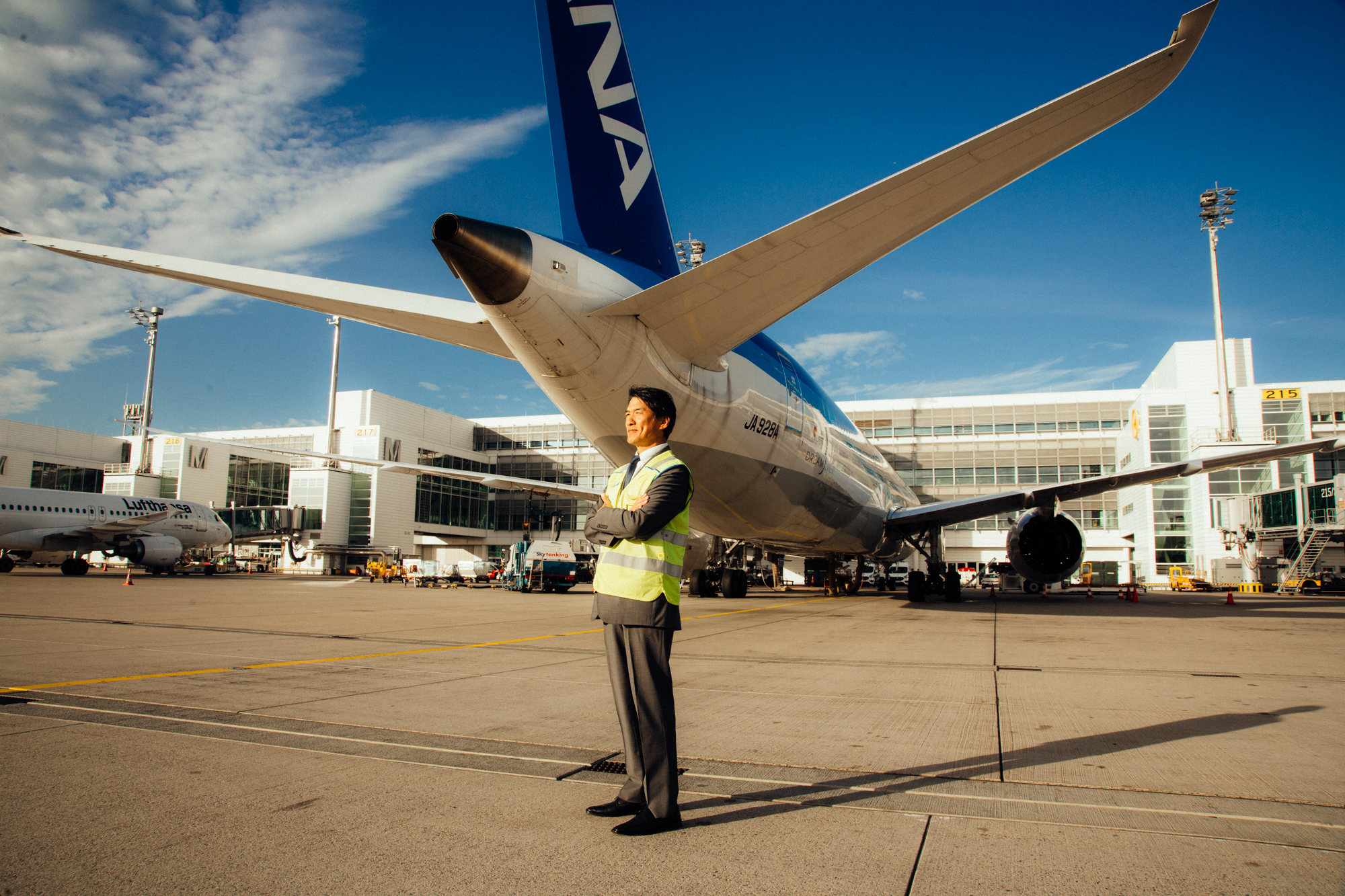More than a year and a half has passed since the airline industry was severely affected by the coronavirus that struck the world. Japan Airlines (JAL), well known for its crane logo, has faced many hardships since its establishment, not only this pandemic. We interviewed Mr. Hirokazu Jo, General Manager of the JAL Frankfurt Branch and in charge of Germany, the Netherlands, and Eastern Europe, about how JAL is applying its history and experience to its business during the crisis, and the future of JAL in the post-Corona era.
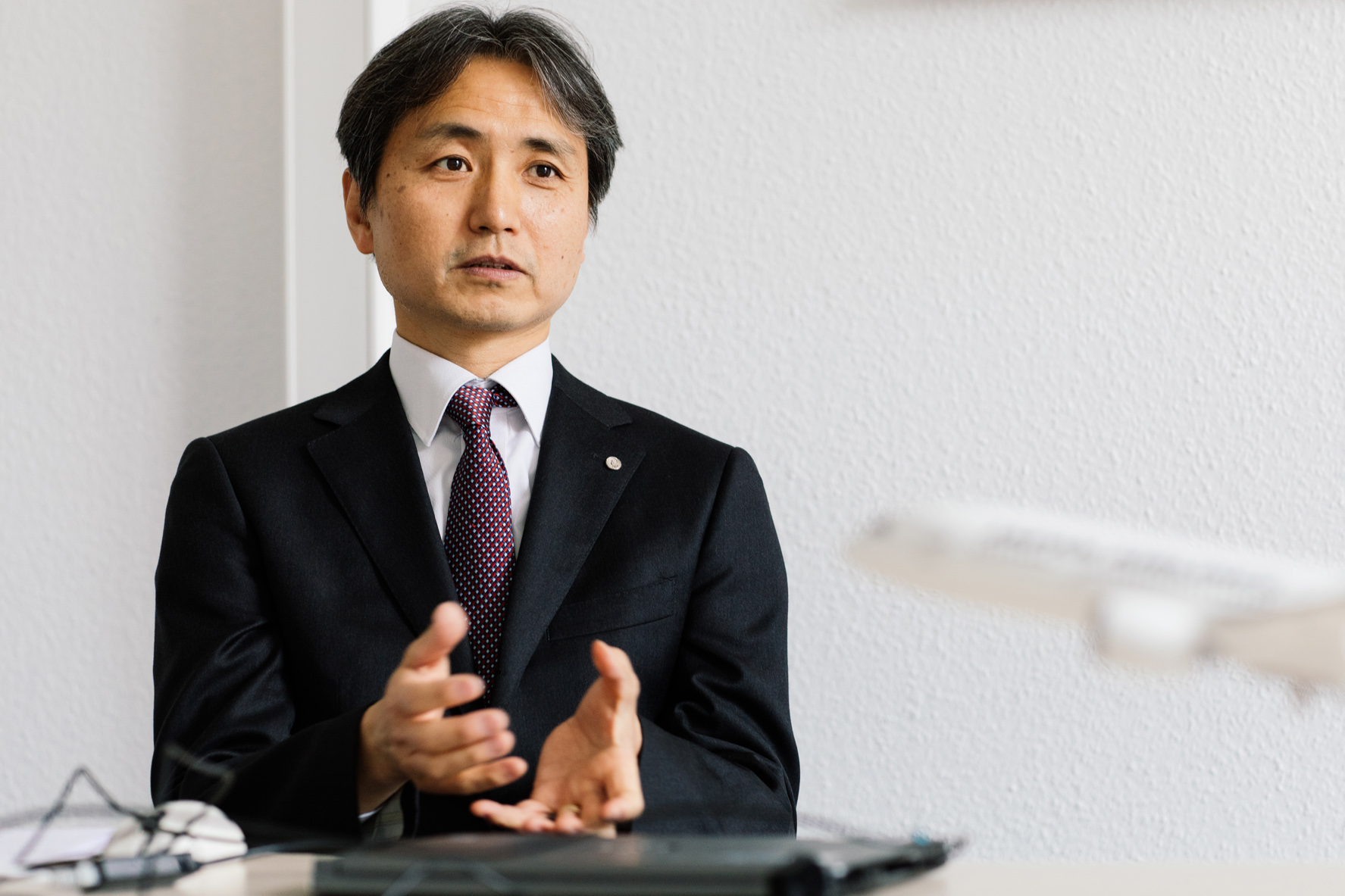
J-BIG: Mr. Jo, first, please tell us about the history of your company.
Hirokazu Jo: The company was founded 70 years ago, in 1951. In Japan and Germany, the defeated countries of World War II, the development, manufacture, and operation of aircrafts were banned for six years by the Allies. With the end of this “blank period”, the JAL was established as the first commercial airline in post-war Japan. In 1953, the Japan Airlines Act was enacted, and under the leadership of the government, the new company was established, which was able to operate international flights. The first international flight was a route between Tokyo and San Francisco via Honolulu, Hawaii, which is now very popular among Japanese. All Nippon Airways (ANA) was established at about the same time, in 1952. ANA’s mission was to promote the international mobility of people and to help revive the Japanese economy. As a result of the high economic growth and the increase in demand for air travel due to the 1964 Tokyo Olympics, the company’s performance rose steadily, and international flights were increased. As a result, for five years from 1983 to 1987, our company ranked first in the world in terms of the number of passengers and cargo weight combined for scheduled international flights.
However, on August 12, 1985, Flight 123 crashed into the ridge of Osutaka. Many people lost their lives, including two Germans. This tragedy was the starting point of our current safe flight operations, and our employees will never forget it. In addition to the hardware measures taken by the aircraft manufacturer, we also strengthened our own safety system by reinforcing our maintenance program and establishing an Aviation Safety Promotion Committee.
Thereafter, passenger demand continued to decline intermittently in the wake of the Gulf War in 1991, the terrorist attacks on the United States in 2001, the SARS epidemic and the Iraq War in 2003, and the Lehman Shock in 2008. Furthermore, the entire airline industry was greatly affected by the soaring price of crude oil. In addition, the emergence of competitors in the late 1980s gradually made the competitive environment more difficult. Our mission was to contribute to the economic development of Japan by transporting people and cargo to all parts of the world, but to be honest, the profitability of some of our routes was questionable. For example, passenger flights to the Middle East were almost never fully booked. As a result of these unprofitable routes, an aircraft fleet that was biased toward large jumbo aircraft, with over 110 planes, and overstaffing, profits were gradually squeezed. The airline implemented structural reforms, including route reductions, fleet reductions, and productivity improvements, but ultimately went bankrupt in January 2010.
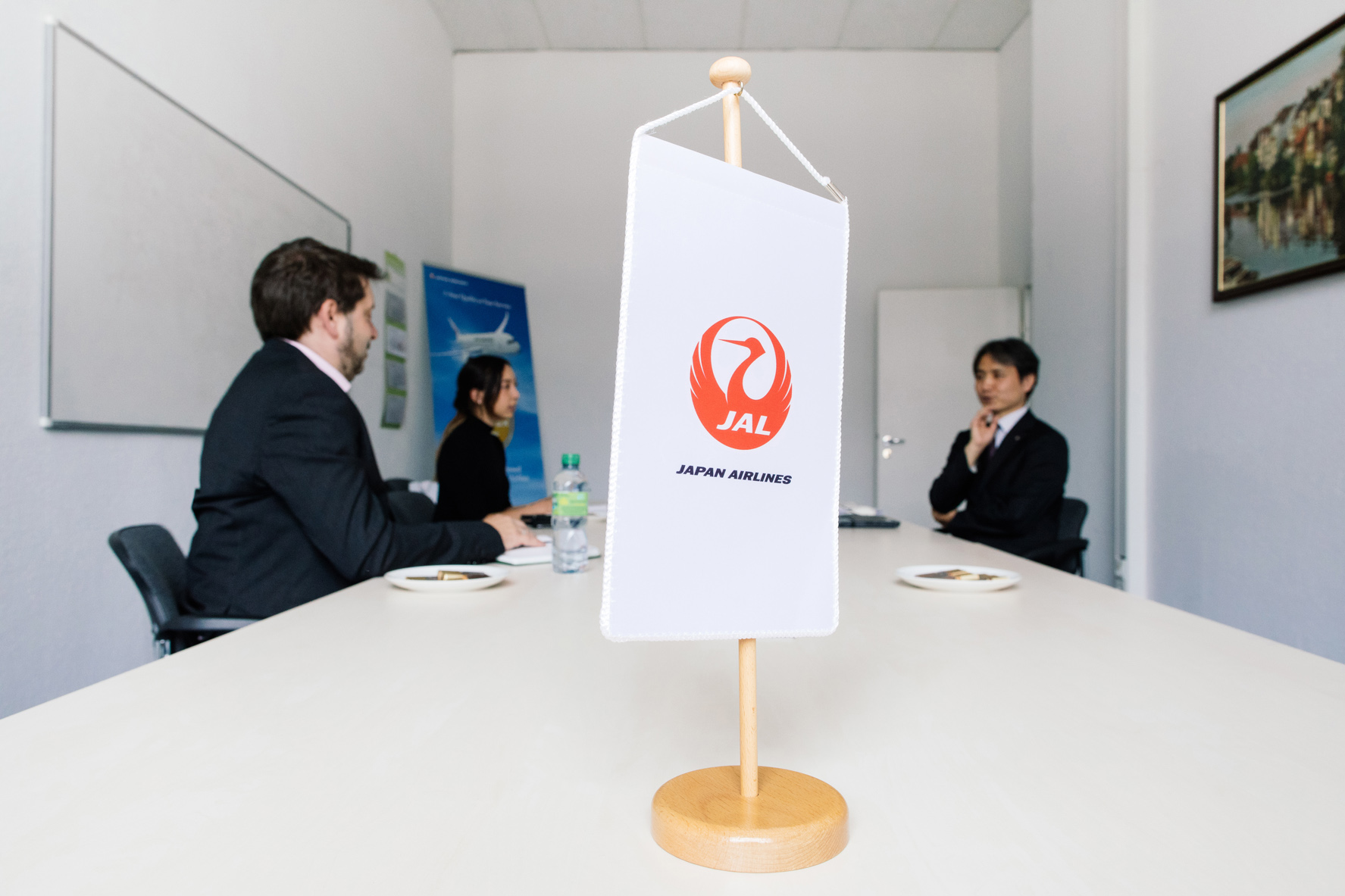
J-BIG: What kind of reforms were implemented after the bankruptcy?
Hirokazu Jo: First, I would like to thank everyone again for giving us a chance to rebuild thanks to a 100 percent capital reduction, a large amount of debt forgiveness, investment from public institutions, and the understanding and support of everyone in society. Specifically, unprofitable routes were reviewed, international flights were reduced by about 40 percent, domestic flights by about 30 percent, and the number of aircrafts was reduced by 30 percent, resulting in a drastic downsizing of the business and a reduction of 1,600 employees – one third of the Group’s total workforce. On the other hand, Mr. Kazuo Inamori, the founder of Kyocera, has been appointed as our chairman. Inamori introduced the “JAL Philosophy” and “Amoeba Management” and led employees to think of their own ways to improve sales and reduce expenses, thereby changing the mindset of each individual. The company’s performance recovered rapidly, and in September 2012, just two years and eight months later, the company was able to re-list on the First Section of the Tokyo Stock Exchange.
The JAL Philosophy is an action guideline consisting of 40 items in two parts and nine chapters, and all employees have a notebook-sized booklet. It is like a moral code that parents teach their children. Employees undergo special training called “Philosophy Education” several times a year so that they can not only understand the action guidelines but also practice them daily. Executives are provided with opportunities to learn about management philosophy through monthly leader study sessions. In addition to this, each workplace has its own initiatives, and independent study groups are held across the organization. I have learned a lot from the section on “Raising awareness of profitability” and the section on individual will, positive thinking and teamwork, which are important in amoeba management. I always try to keep in mind not only costs, but also the need to create new value and profit. I have met Mr. Inamori several times in the past. He is a strict person, but he pushes people to take on challenges.
In Japan, participants used to discuss the JAL Philosophy over a can of beer after a study session. Before the bankruptcy, employees in each department, such as flight attendants, mechanics, pilots, and sales staff, had a strong sense of vertical division, and there was a distance between executives and employees, but this also changed dramatically with the restructuring. Not only that, but the mindset of each one of us was also renewed. And although it is quite natural for a private company, we became aware that no one would help us anymore and that we had to be prepared to accomplish things on our own.
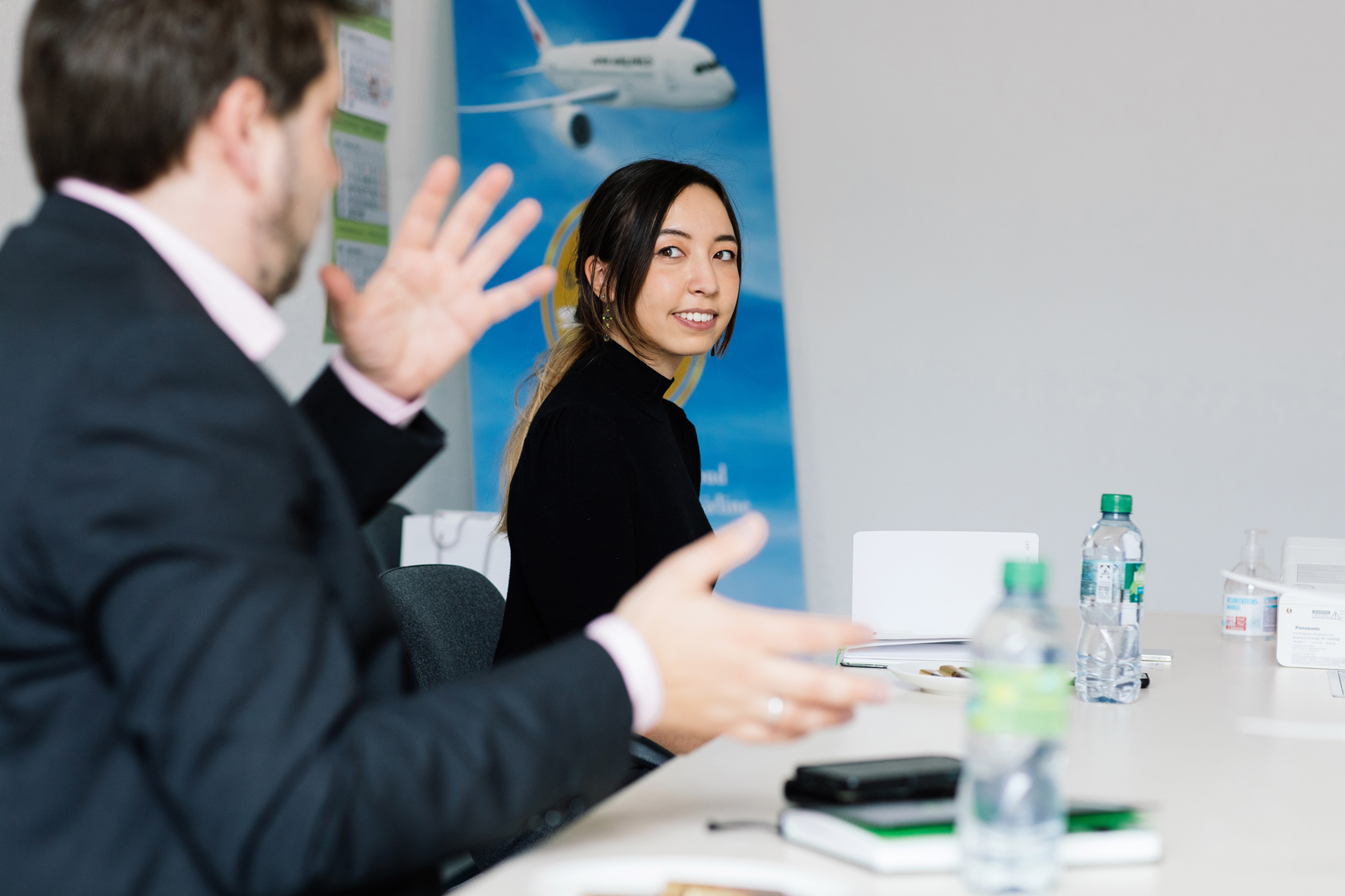
J-BIG: Please tell us about your career at JAL.
Hirokazu Jo: I joined JAL in 1988, and after many years of experience in administrative operations such as general affairs and human resources, I was responsible for aviation security in the Safety Promotion Division before being posted to Germany. During my term of office, there were a series of terrorist incidents at Brussels Airport and other locations in 2016, and the Tokyo Olympics and Paralympics were coming up, so I was focused on strengthening the security system within the company. Although I was transferred to Germany in May 2019, this is not the first time I have been stationed in Germany. I spent about two and a half years in Germany from 1994 to 1997, and thankfully there was a language training program at that time. I spent six months in Schwäbisch Hall, Baden-Württemberg, and in Bonn, North Rhine-Westphalia, to attend language schools.
To be honest, I am surprised that I can still remember a little bit of German, even though my last assignment in Germany was more than 20 years ago. I try to communicate in German with people in Germany, both inside and outside the company. The experience I had back then has been very useful.
J-BIG: Were you hoping to return to Germany again?
Hirokazu Jo: Of course, I wanted to be stationed in Germany again someday. I always liked languages. I learned English through my part-time job at Disneyland for four years when I was a student, and I had a strong yearning for international work. However, as I was already over 50 years old, it was unlikely that I would ever be stationed overseas again, so to be honest, I had given up. As I mentioned earlier, I had been working in the Safety Promotion Division, which was not directly related to the operations of the overseas branches, so I assumed that I would be transferred within Japan. When the transfer was decided, my family was surprised. I am now living in Germany with my wife and two sons. It is the first time for my family to live abroad, so it has been a good experience for all of us.
J-BIG: Please tell us about JAL’s history in Germany.
Hirokazu Jo: In 1960, the first offices were opened in Hamburg and Frankfurt. The following year, Düsseldorf followed, and from 1962 onwards, flights from Frankfurt to Japan started and have been in continuous operation up to the present. In fact, between 1965 and 1992, several routes originating in various parts of Germany were opened, but all except the Frankfurt route were later suspended.
Hamburg, which opened in 1965, was closed in 1988 due to the arrival of more Japanese people in Düsseldorf. So Düsseldorf opened in 1985, but was closed in 1991. Munich, which operated from 1992 to 1995, is now home to more Japanese people than Düsseldorf, but at the time, there was not enough demand to make it profitable. In addition, Berlin Brandenburg International Airport opened last October on the outskirts of Berlin. But the old Schoenefeld Airport was not in good condition, so it was shut down only one year after its opening in November 1991 since Japanese companies did not expand into Berlin as much as expected. Although there are many Japanese people in Düsseldorf, Frankfurt is more convenient for connections to other parts of Europe and has more demand, so it was closed. But until October of last year, a private bus service was provided to take passengers to Frankfurt. Currently, the only remaining route is the Frankfurt – Narita route. Before the Corona disaster, ANA operated 28 flights per week between Japan and Germany from three airports in Germany, while we operated seven flights per week from one airport.
Currently, we have offices in Frankfurt and Düsseldorf, and we have about 50 employees in Germany. Five employees are dispatched from Japan and most of them are locally hired employees. We exchange information with the head office in Japan daily, mainly regarding flight management, adjustment of flight schedules, and new Coronavirus-related issues. We also work with the Consulate General of Japan and other organizations to ensure that we have an accurate grasp of regulatory information related to the new Coronavirus, which changes daily, and deliver it to our customers who are planning to travel.
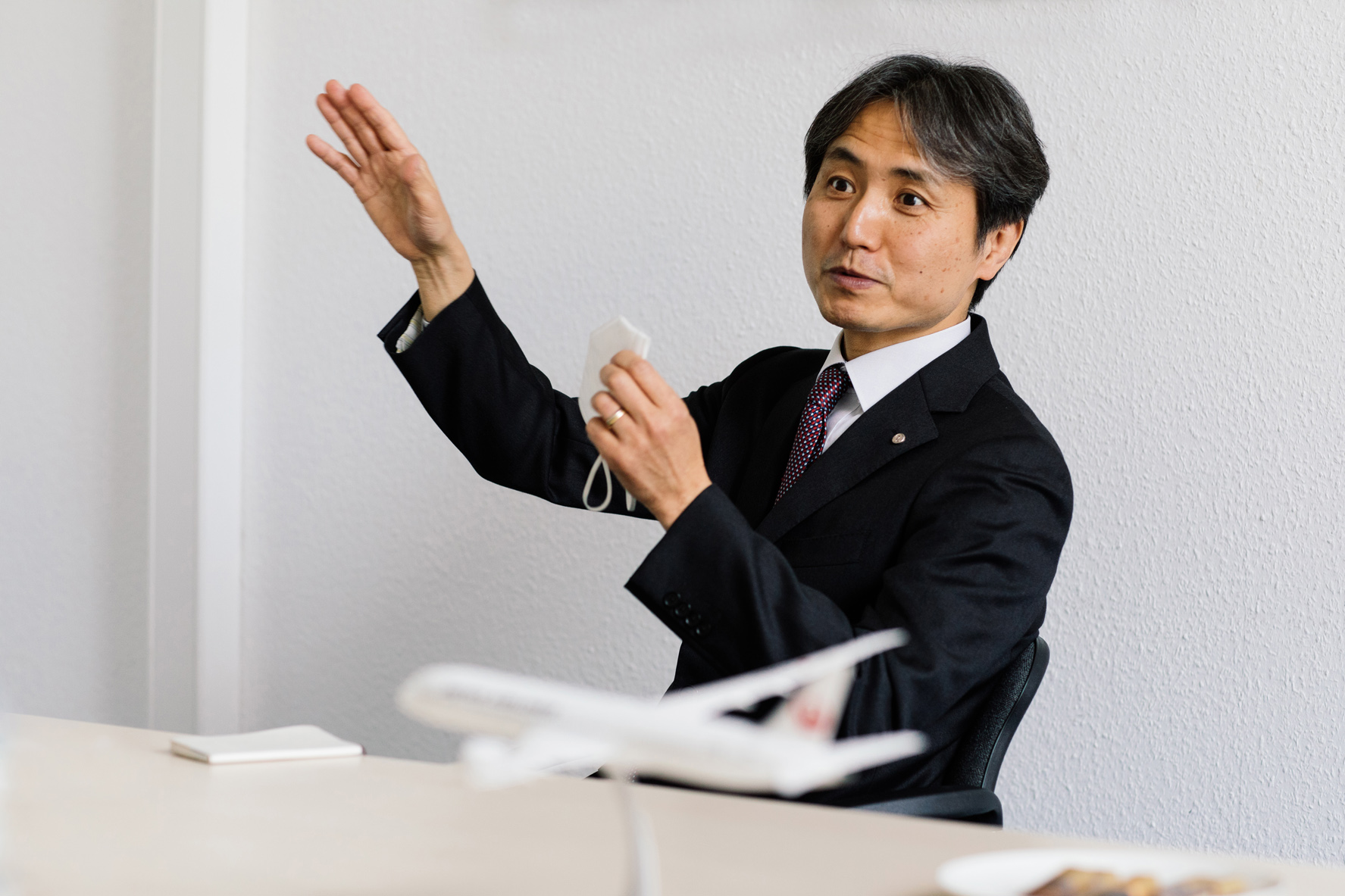
Free Subscription
“J-BIG – Japan Business in Germany” is the e-mail magazine dedicated to Japanese companies and their business activities in the German market.
J-BIG: In addition to direct flights from Frankfurt, are there any other initiatives you are working on to encourage people to use JAL?
Hirokazu Jo: In cooperation with Finnair, a Finnish airline, we offer flights from various parts of Germany to Haneda Airport via Helsinki. Thanks to this collaboration, we have been able to greatly expand our coverage to include Munich, Stuttgart, Frankfurt, Düsseldorf, Hanover, Berlin, Hamburg, and other cities. Like Lufthansa and ANA, we are now able to provide customers living near cities that do not have direct flights to Japan with routes that allow them to connect to flights to Japan in a short time. Many Finnair flights were suspended because of the Coronavirus, but recently, about half of the flights have been restored on some routes. We hope people will take advantage of this.
Also, due to the Corona pandemic, the number of flights from Europe to the Kansai area has been greatly reduced, so we will be operating flights from London to Kansai every Sunday in July and August. We hope that many passengers from Germany will also be able to use this flight.
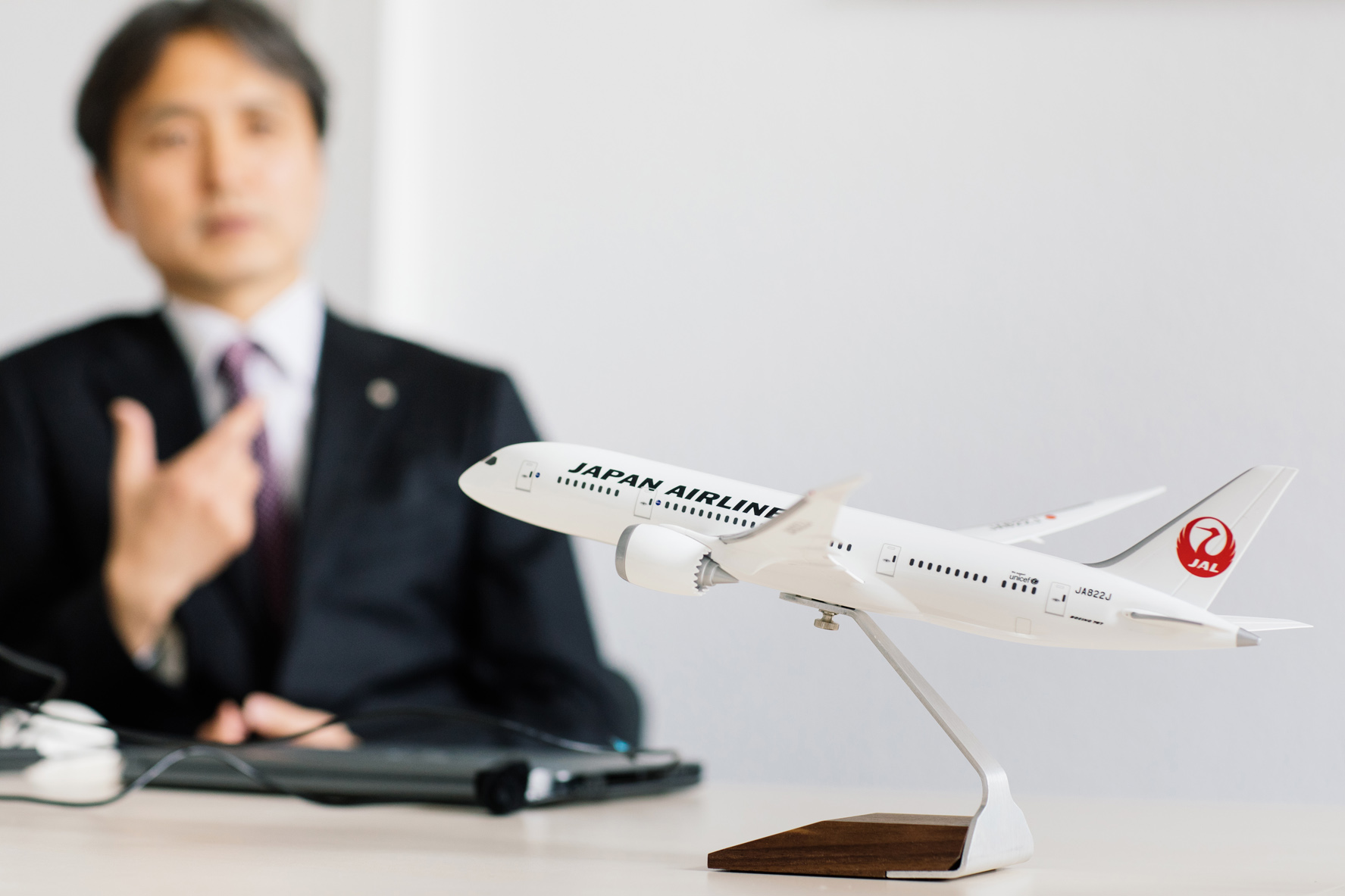
J-BIG: How has your revenue changed before and after the pandemic?
Hirokazu Jo: In Japan, the government’s policy was to attract 40 million inbound passengers by 2020, when the Tokyo Olympics were scheduled to be held. In fact, inbound demand was strong in 2018 and 2019, with approximately 31 million and 32 million visitors respectively. Our revenue from international passengers was 476.2 billion yen in fiscal year 2019, while domestic passenger revenue was 514.6 billion yen. To aggressively capture this demand, we also had plans to launch ZIPAIR, a low-cost airline specializing in medium- to long-haul routes, in the first half of 2020.
Just as this was about to happen, the Corona pandemic hit the world, and sales from international passengers sales for fiscal year 2020 dropped to 27.9 billion yen, a decline of about 94 percent from the previous year. Domestic ticket sales also fell by about 67 percent compared to the previous year. We used to operate one flight from Frankfurt every day, but now, we operate only three times a week – on Wednesdays, Fridays and Sundays. We are facing a crisis not seen since the bankruptcy of the company.
On the other hand, despite this situation, the cargo business “JALCARGO” has increased its operating revenue by nearly 40 percent. We had withdrawn from regular cargo flights after our business collapse and continued only with flights carrying passengers. As a result, our supply space was limited to the under-floor cargo compartments of passenger aircrafts. However, in 2019, we resumed scheduled cargo flights between Japan and the U.S. utilizing other companies’ cargo planes, and now we are also conducting charter operations between Japan and Europe. Because of the Corona pandemic, the transportation capacity of regular passenger flights using the under-floor cargo compartment has been drastically reduced worldwide, but we are actively picking up the strong demand caused by the stagnation of marine transportation by using passenger aircrafts and other companies’ dedicated cargo aircrafts. For example, we are transporting vaccines for the new Coronavirus to Japan with passenger aircrafts from Brussels Airport, which is not served by regular passenger flights.
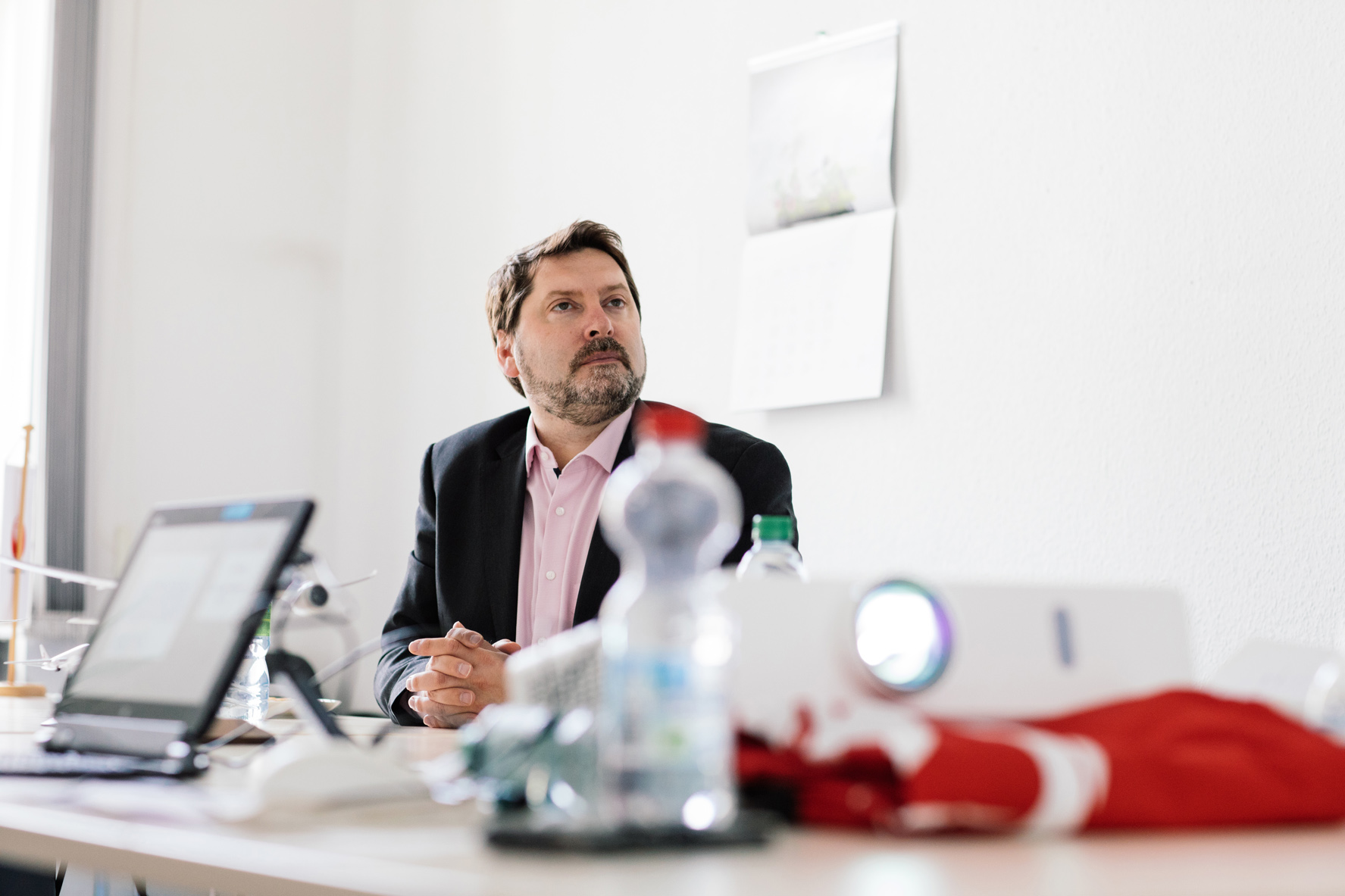

J-BIG: How does the JAL Philosophy affect you in a crisis situation?
Hirokazu Jo: Since Japan does not have a short labor system like Germany, we have greatly increased internal training while sending some employees to other departments within or outside the company. Currently, the company strives to maintain employment by dispatching approximately 1,700 employees to other companies’ call centers, customer contact operations such as restaurant delivery services, and local governments.
On the other hand, in Germany, it is difficult to dispatch employees to other companies, so we have adopted the short labor system for our employees. We are also organizing manuals, expanding individual skills and qualifications, and doing other things that we could not do in the past because we were too busy with our daily work. Furthermore, we are making thorough cost-cutting efforts. For example, in the past, we used to wrap cargo in plastic wrap and string to make it waterproof, regardless of weather conditions. But now, our employees check the weather conditions and implement this measure only when necessary, thereby saving on material costs.
However, there is a limit to how much we can cut costs, so we are also encouraging our employees to actively participate by developing and proposing new businesses. For example, the cargo sales division is not only experiencing strong demand, but also gaining new customers, which leads to improved profitability. In addition, the passenger sales division started replacing the bus service from Düsseldorf to Frankfurt with a discounted car hire service in February of this year, and the number of passengers is gradually increasing. We hold online seminars to provide our customers with the latest information on procedures for entering Japan as well, and as a contribution to the local community, we have started to offer online etiquette classes at Japanese schools in Düsseldorf and Amsterdam. We also offer aviation classes at Japanese schools in Frankfurt and other cities, which we used to do by visiting the schools directly.
Although these initiatives were directed by top management, many of them were proposed by employees who put into action tenets of the JAL Philosophy, such as “self-motivated” and “boldly challenging,” and thought about what they could do now on their own. We are blessed with wonderful employees, for which I am grateful. I am sure that there are things that we can utilize from our past experiences to overcome the Corona disaster.
J-BIG: Presuming that is will become easier again for Japanese living abroad as well as foreign tourists and business travelers to travel to Japan, what preparations are you taking for the future?
Hirokazu Jo: Germans and Japanese in particular are very concerned about hygiene, so we have implemented a variety of thorough countermeasures against infectious diseases that will allow them to fly with peace of mind.
As a result, we have received the highest rating of 5 stars in the “Covid-19 Safety Rating” by SKYTRAX, a British airline evaluation organization, and the highest rating “Diamond” in the U.S. “APEX Health Safety Powered by SimpliFlying”. Specifically, these measures include non-contact and automated support at airports in Japan, anti-viral and anti-bacterial coating in the cabins of all aircraft, and a “JAL Corona Cover”, which provides compensation for expenses and consultation services in case of infection.
In addition, as soon as the infection situation in the world settles down, we expect leisure demand to return first, so we are thinking of making effective use of our three Low Cost Carriers, or LCCs for short. SPRING JAPAN will be responsible for short-haul international flights to China, Jetstar Japan for domestic flights, and ZIPAIR for medium- to long-haul international flights to the United States. ZIPAIR’s service area covers medium- to long-haul flights from Japan to Honolulu and Bangkok, which is unusual for an LCC. I personally hope that ZIPAIR will operate flights to Europe, sooner or later.
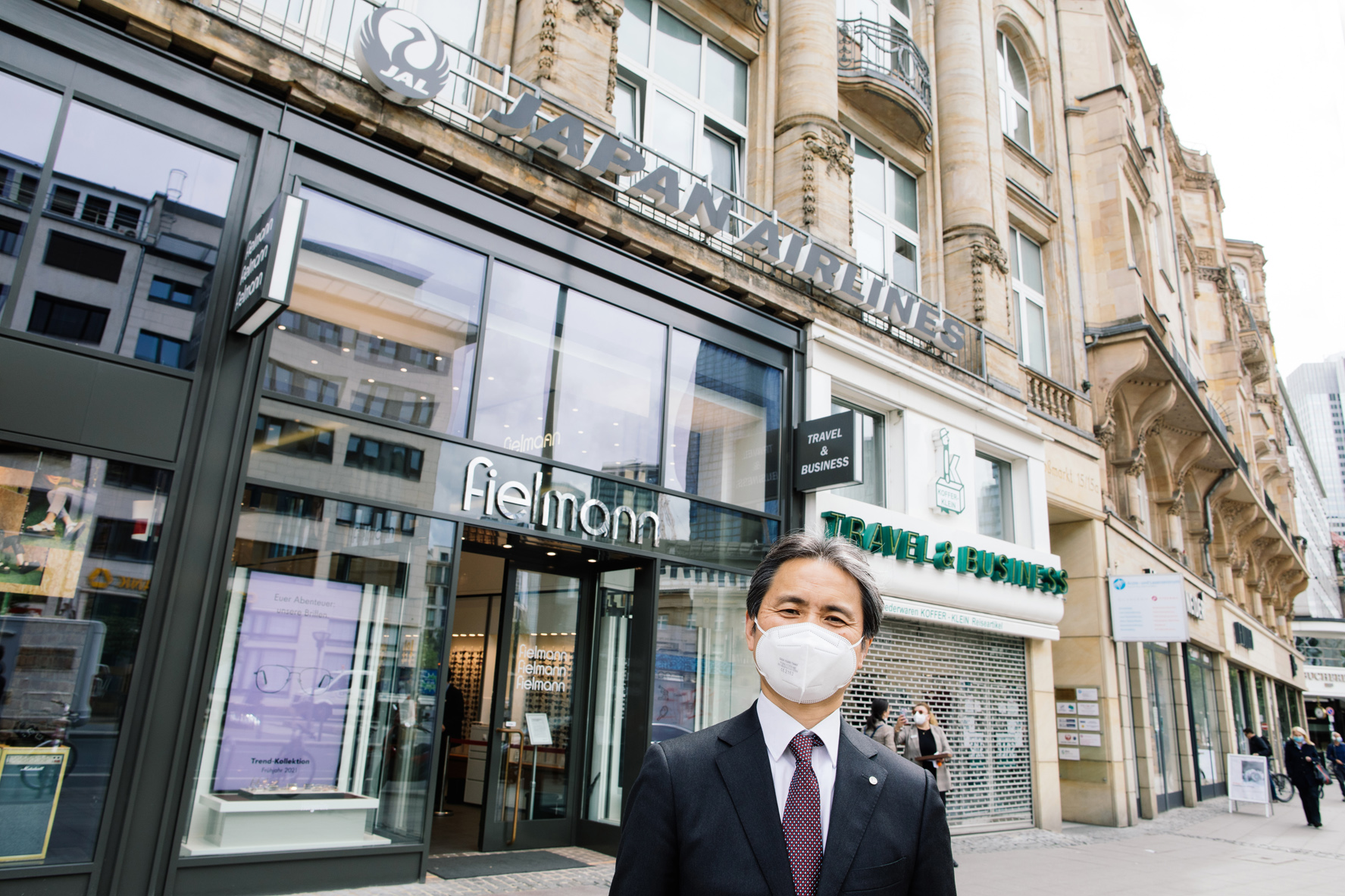
J-BIG: Do you expect aviation demand to recover next year?
Hirokazu Jo: The International Air Transport Association (IATA) predicts that global air demand will not recover to 2019 levels until 2023. I don’t know when exactly that will be, but I also believe that demand from tourists and business travelers visiting Japan will definitely return after the Corona disaster is resolved.
In the past few years, passenger traffic has been increasing worldwide and competition in the aviation market has become fierce. On the other hand, the “flight shaming” has led society to scrutinize air transportation businesses that place a heavy burden on the environment more closely. Reviewing aircraft technologies and fuels to reduce CO2 emissions is a challenge for all airlines, and we have set a goal of virtually zero CO2 emissions by 2050. We are actively upgrading our fleet to fuel-efficient aircraft such as the A350 and are working to reduce the amount of fuel used by devising new flight operations. In the future, we will also introduce aircrafts that use hydrogen, electric power, and other technologies. Furthermore, we will increase the use of sustainable alternative fuels to replace fossil fuels. We will strive to gain the understanding of society through concrete actions to achieve the UN’s Sustainable Development Goals as well as protect the environment.
This year marks the 160th anniversary of Japan-Germany relations, and next year will be the 60th anniversary of our company’s service between Japan and Germany. Although it is still difficult to make plans in these difficult times, we hope to be able to give something back to our customers, local governments, and everyone involved who has supported us despite past accidents and business failures. To that end, I sincerely hope that the day will come soon when everyone can come and go as freely as before between Germany, Europe and Japan.



